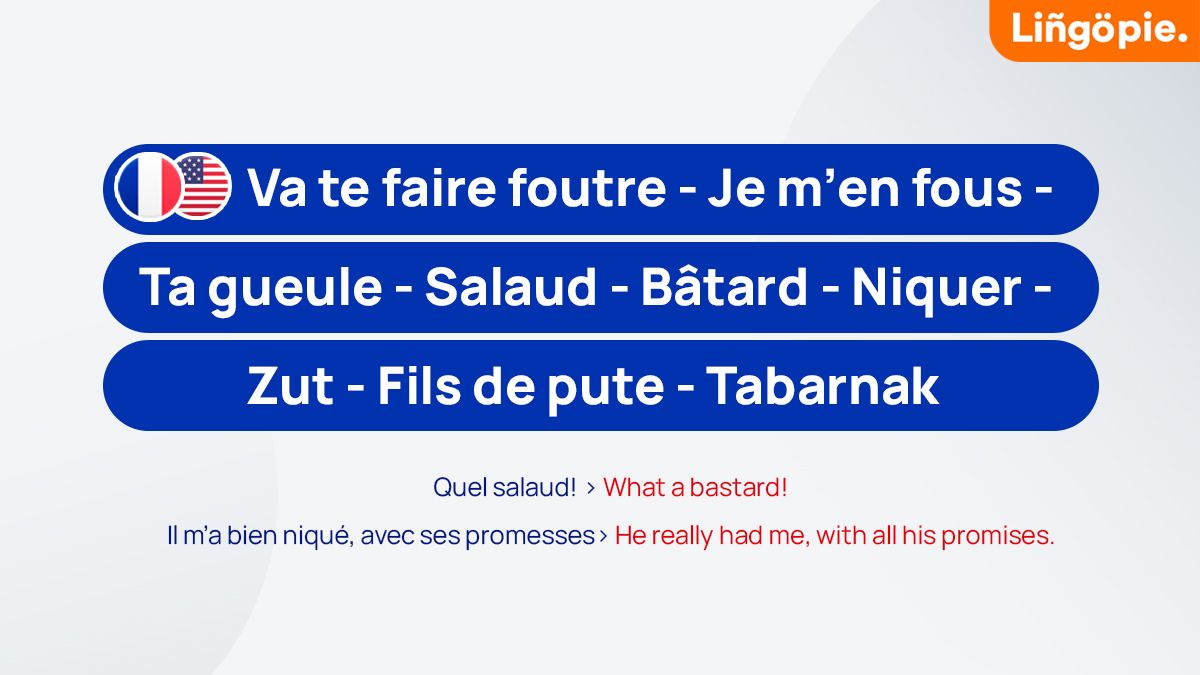Ever wondered why people are obsessed with learning swear words in a new language?
Let’s be honest—cursing is one of the first things we ask our bilingual friends to teach us. It’s fun, a little rebellious, and surprisingly useful. When it comes to French, swearing is practically an art form. If you’ve ever watched a French movie, you know the French don’t hold back. From a traffic jam to a spilled glass of wine, there’s always a colorful phrase ready to fly.
Studies show that swearing can help relieve stress and even build social bonds. But beyond the laughs, learning French swear words how and when to use them gives you insight into real, everyday conversations—the kind of fluency you don’t get from textbooks. Want to master the good, the bad, and the hilarious parts of French? Check out our curated list of French TV shows and movies on Lingopie and learn the real way people speak.
French Curse Words
Some of these curse words are widely used and not considered to be highly disrespectful, but others can come across as extremely harsh and you will have to think twice before blurting them out loud.
Excited to learn more? Let’s take a look:
Putain
‘Putain’ is definitely the most commonly used French swear word. If we translate it literally into English it means ‘whore/ prostitute’, but in France it is used as ‘fuck’ or even ‘shit’.
You can use ‘putain’ in almost every situation: anger, frustration, desire, joy, sadness, exaggeration, surprise. Trust me, the only limit is your imagination.
It’s not the harshest French swear word out there, but I would still avoid using it around children. A common phrase used in France when someone is really mad is ‘Putain de merde’. It means something along the lines of ‘fucking hell’.
Here are more examples:
● Putain, tu m’as fait peur! Fuck, you scared me!
● Il fait une putain de chaleur! Its so fucking hot!
Merde
‘Merde’ is another popular curse word- perhaps not as popular as ‘putain’ but it is still used a lot. Merde translates as the English ‘shit’ or ‘crap’. It is used when you want to describe something that is of bad quality, to express disappointment, or to express having messed something up.
You may hear these expressions in France with the word ‘merde’:
● Tu as merdé - You messed up
● Bordel de merde - for fuck’s sake

Connard/ Connasse/ Con
Connasse is the feminine version of connard. As you can probably guess, con is the shortened version for both.
The English equivalent for this insult would be ‘asshole’, ‘jerk’ or ‘cunt.’ This curse is generally used to describe someone you really dislike, or for when someone is acting a bit stupidly towards you.
Because it is quite a strong insult, be careful when using it. A popular expression used in France is ‘C’est con’. This simply means ‘It’s dumb.’
Here is another example:
● ‘C’est un vrai connard!’ - ‘He’s a real asshole!’
Dégage
Fingers crossed you won’t have to, but this is the curse word you will need if you want to tell someone to get lost. Depending on how angry the speaker is, ‘dégage’ can mean an unkind ‘get out of my way’ or ‘move’, to a full explosive ‘fuck off!’
Ouch!
Example:
● ‘Dégage, j’essaie de travailler!’ Get out of here, I’m trying to work!
Va te faire foutre
The English equivalent of ‘va te faire foutre’ is a very rude ‘go fuck yourself’.
This phrase is not to be used lightly. You will hear it when a person is extremely angry or pissed off. It’s also quite vulgar so I would encourage you not to use it (unless you find yourself in a scenario where the other person has really been asking for it!)
Je m’en fous
‘Je m’en fous’ is a strong way of expressing that you don’t care about something. The closest translation would be ‘I don’t give a fuck’.
I would be careful with this expression because it is easily confused with the other common French phrase ‘Je m’en fiche’. ‘Je m’en fiche’ is a lighter way of saying ‘I don’t give a damn.’
So please, for the love of God don’t say ‘Je m’en fous’ to your boss at work or to any of your school teachers. You will find yourself in a lot of trouble.
For reference, a more polite way of saying ‘I don’t mind’ is ‘Ça m’est égal’ (it’s all the same to me).
Ta gueule
‘Ta gueule’ is a great French expression because it is short, snappy and gets straight to the point. It also sounds pretty cool.
‘Ta gueule’ means ‘shut up’ or ‘shut your face/gob’ in French. However, this isn’t the most polite way of telling someone to be quiet (stick to tais-toifor that).
A gueule is an animal’s mouth, so now you can see why it comes across as disrespectful.
You definitely won’t want to use ‘ta gueule’ in formal situations. But when you want to demand silence in an abrupt way, that’s when you would throw it in.
Salope/ Salaud
Salaud is the masculine noun, whereas the feminine is salope. These curse words are definitely not pleasant- they mean bastard (salaud) and bitch (salope). Salopederives from the French word sale, which means dirty, so it is also used frequently to refer to a woman with loose morals.
● Quel salaud!- What a bastard!
● Salaud, tu m’as bien eu! - Bastard, you really had me fooled!
Bâtard/ Bâtarde
You probably guessed this one as it looks similar to the English curse word- it’s the French word for bastard. Bâtarde (with the added e) is used for the feminine.
● Bâtard, tu vas me le payer! Bastard, you’ll pay for this!

Niquer
Niquer is a vulgar way of saying “to make love”. Translated into English it would be to “fuck” “screw” or to “bang”. Be very cautious if you are to use this word- as I said, it is extremely vulgar.
Niquer can also mean “to screw someone over” , so remember it can be used in different contexts.
For example:
● Il m’a bien niqué, avec ses promesses- He really had me, with all his promises.
Zut
This is perhaps the least vulgar, (but extremely useful) French curse word out there. It means “darn” or “damn” and you can use it in many situations. For example, if you spill your tea on the floor you can say “zut alors!” which means “damn it!”
This is the safe option if you want to curse! (And it’s so easy to remember!)
Fils de pute
“Fils de pute” means “son of a bitch” or “son of a whore” in English. So yeah… it’s definitely not a nice insult to throw at somebody. It’s useful to know what it means, but I would avoid using it at all costs!
Tabarnak (Quebec)
I thought I would include a French Canadian curse word on this list. This word is purely used in Quebec- you will not hear it in France.
‘Tabarnak’ has the approximate meaning of “holy fuck” in English. It is considered both vulgar and offensive.

Ready To Speak French?
So there you have 13 of the most commonly used French curse words. If you are able to include some of them when speaking French, this is great! Swear words are good ways of expressing yourself a little better, exaggerating certain emotions and to just sound a bit more French!
Be mindful of who you are talking to though! You don’t want to put yourself into an awkward situation.
To further your French learning, have a look at the 13 best French movies for beginners. Watching movies is one of the best ways to pick up new French words and to improve your listening skills.
Sign up to our 7-day free trial at Ligopie and take a look at our wide selection of French series and videos. How about challenging yourself to see if you can pick up any spoken swear words whilst watching our shows?
Bonne chance!
FAQ
What is a famous French cuss word?
One of the most famous French swear words is “merde”, which literally means “sh*t.” It's used in all kinds of situations—frustration, surprise, or even just for dramatic effect. It’s so common that it’s almost become a part of everyday conversation in France. You’ll hear it in movies, on the streets, and probably in your French lessons (if your teacher is cool enough).
Is the F word a French word?
The F word is not of French origin. Its exact etymology is uncertain but is believed to come from Germanic languages, related to words meaning striking, rubbing, or having sex. It may also be linked to an Old French word with a similar meaning.
Is zut a bad word?
"Zut" means "darn" or "heck" in French. It is not considered a bad word and is generally acceptable in polite society.
How do you swear in French slang?
Swearing in French slang is all about intonation and context. Besides “putain” and “merde,” there’s a whole arsenal of slang like:
- “bordel” (a mess or chaos)
- “con” / “conne” (idiot, but can be harsh)
- “foutre” (a rude version of “to do/put,” depending on how it’s used)
Slangy swearing often mixes everyday words with sarcasm, irony, or dramatic flair. Watching real native speakers on shows or YouTube helps you pick up these nuances fast.
What is the #1 French swear word?
It’s hard to crown just one, but if we had to pick, “putain” would probably be the most widely used and recognized French curse word. It’s short, punchy, and incredibly flexible—it can be an insult, an exclamation, or even an emotional reaction. Just like the F-word in English, it can be both vulgar and weirdly expressive.









